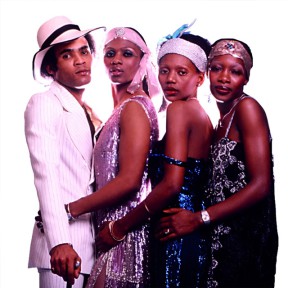Boney M. | Rasputin (1978)
"Rasputin" is a 1978 Euro disco hit single by the Germany-based pop and Euro disco group Boney M., the second from their album Nightflight to Venus.
It was written by the group's creator Frank Farian, along with George Reyam and Fred Jay. With a tune resembling the second half of the Turkish folk song "Kâtibim", it is a semi-biographical song about Grigori Rasputin, a friend and advisor of Tsar Nicholas II of Russia and his family during the early 20th century.
The song variously sensationalizes Rasputin as a playboy, mystical healer, and political manipulator.
Composition
"Rasputin" references the hope held by Tsaritsa Alexandra Fyodorovna that Grigori Rasputin would heal her hemophiliac son, Tsarevich Alexei of Russia. It also claims that Rasputin was Alexandra's paramour: "Ra Ra Rasputin, lover of the Russian queen, there was a cat that really was gone", "Russia's greatest love machine", "to Moscow chicks he was such a lovely dear".
The song claims that Rasputin's political power overshadowed that of the Tsar himself in "all affairs of state". When his sexual and political acts became intolerable, "men of higher standing" plotted his downfall, although "the ladies begged" them not to. Although the song states "he was a brute", it claims that the ladies "just fell into his arms."
The end of the song recounts a modified version of a popular description of the events that culminated in Rasputin's assassination, as perpetrated by Felix Yusupov, Vladimir Purishkevich, and Dmitri Pavlovich, on 16 December 1916 (O.S.). The song claims that Rasputin's assassins fatally shot him after he survived the poisoning of his wine.
While the song accurately re-tells many of the unfavorable rumors that damaged Rasputin's reputation, there is no verifiable evidence to suggest that he had an affair with Alexandra. Frank Farian's American friend Bill Swisher, who was a soldier in Germany at the time, provides spoken vocals at the bridge in the form of a newsreader. Swisher has also guested on Boney M. singles such as "Ma Baker" and "El Lute".
AllMusic's journalist Donald A. Guarisco described it as "a tribute to the legendary Russian historical figure that uses balalaikas to create its textured rhythm guitar hook."
Its melody has been compared to that of the traditional Turkish song "Kâtibim", but the band denied any similarity...
















































